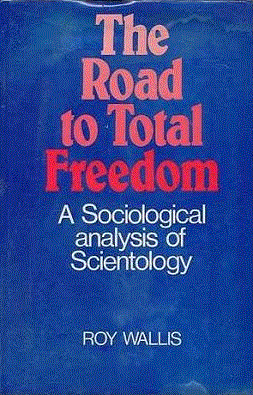The Road to Total Freedom

Cover
|
|
| Author | Roy Wallis |
|---|---|
| Country | United States |
| Language | English |
| Subject | Scientology |
| Publisher | Heinemann |
|
Publication date
|
1976 |
| Media type | Print (Hardcover) |
| Pages | 282 |
| ISBN | |
| Preceded by | Sectarianism |
| Followed by | Culture and Curing |
The Road to Total Freedom: A Sociological Analysis of Scientology is a non-fiction book about Scientology by sociologist Roy Wallis. Originally published in 1976 by Heinemann, it was republished in 1977 by Columbia University Press. The original manuscript was the product of Wallis's doctoral research at Oxford under the tutelage of Bryan Wilson. Wallis, after a review of the original manuscript by Scientology leaders, made edits to about 100 passages before publication.
In the book, Wallis first analyzes the degree to which the Church of Scientology views itself as legitimate, as well as to what degree external society regarded the organization as "respectable" or "deviant". Furthermore, he provides a contextual history of the organization, including a discussion of the Dianetics movement founded by L. Ron Hubbard. Next, Wallis discusses the appeal of the Scientology practice of Auditing, and compares this to abreaction therapy. And finally, he examines how Scientology shifted from a cult to a sect in structure, and analyzes the authoritarian nature of the management of the organization.
While Wallis was researching the book, the Guardian's Office, Scientology's intelligence agency, investigated him. They assigned an individual as an undercover agent who pretended to be a student at Stirling University, where he was teaching. The agent inquired if Wallis was involved with illegal drugs. Wallis later discovered forged letters purportedly sent by him and designed to implicate him in controversial acts. Wallis assumed this was a reaction by the Guardian's Office to The Road to Total Freedom.
...
Wikipedia
